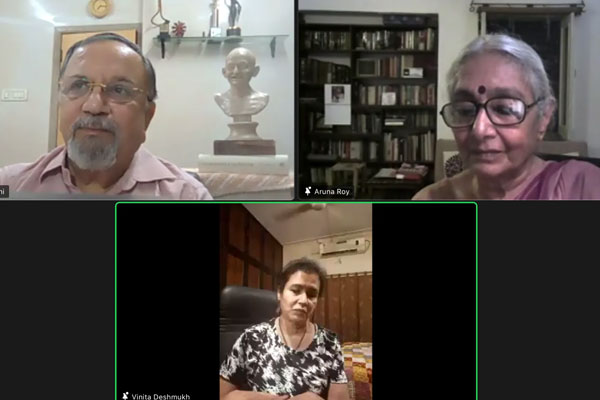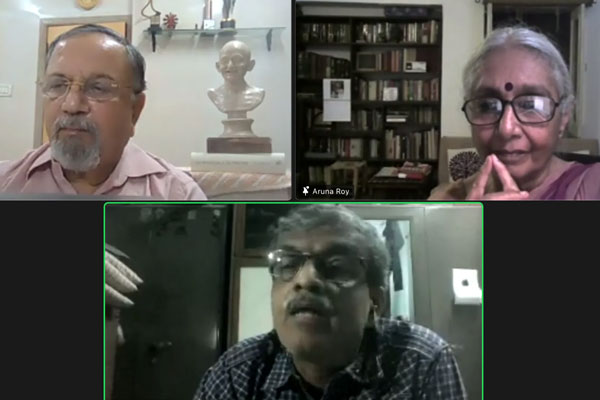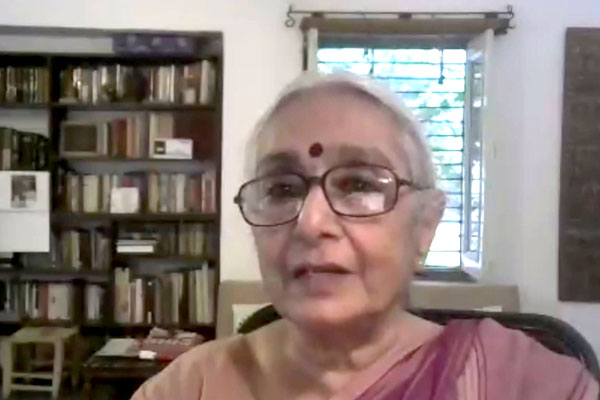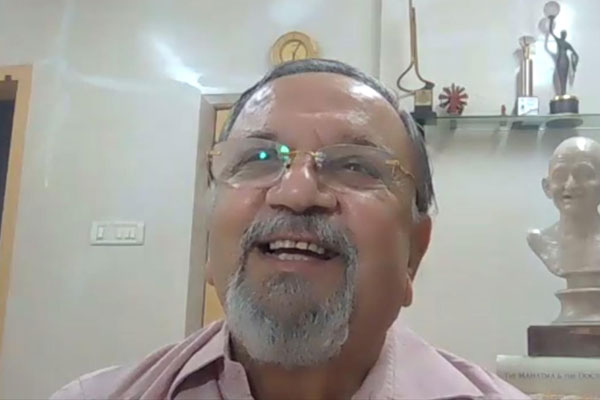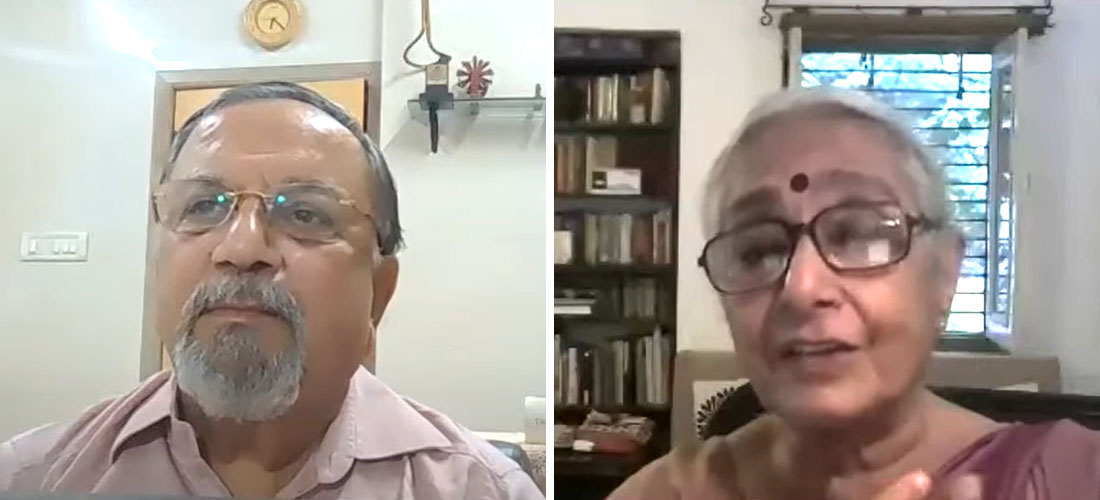
“The Right to Information (RTI) law is power disseminated. Information is power and hence disseminating information translates into the dissemination of power and what it has done is, is unpacked those centres of power, centres of impunity, which wreaked havoc and that is rare -- something which the RTI law has been able to do. It has really been a powerful tool,” says Aruna Roy, founder of the National Campaign for People’s Right to Information. She was speaking at a new RTI series, ‘Conversations on RTI with Shailesh Gandhi’ launched by Moneylife Foundation.
“The RTI Act is like water, by itself it is nothing. You have to apply it to something. To forestry, human rights, pensions, rations, wages, women's rights or rights in a municipality. This is where it takes power. It flowers and goes to fruition and therefore a transformative law,” she added.
Shailesh Gandhi, the former central information commissioner and a transparency evangelist started the discussion by sharing his journey into the RTI movement. “I must mention another interesting fact, there are two ladies in today’s session, who are directly linked to my journey into the RTI movement. I first heard the term Right to Information at a meeting at Sucheta Dalal’s house in 2003 when Maharashtra got its first RTI Act and subsequently, I got into the national movement, thanks to Aruna Roy,” he says.
Speaking further on the beginning of RTI, Mr Gandhi says, “Aruna (Roy) is a pioneer of the RTI movement, in some ways she invented the act for places in rural Rajasthan. While most people work in cities, Aruna along with Nikhil Dey and Shankar Singh helped promote the act in rural areas.”
Sharing some interesting anecdotes from the initial days of the RTI movement, Ms Roy, an officer from the Indian Administrative Services (IAS) cadre talked about how the most famous slogan came into existence.
She says, “We went to a press conference with my friend Sushila. A journalist asked her, “tum kitne tak padhi likhi ho (till how much have you studied) and she replied, “Mein chauthi pas hun” (I studied till fourth standard). The journalist responded when senior people have not found anything, how could a fourth standard passed hope to help draft the RTI Act? She gave a beautiful response, saying, “Jab mein mere bete ko dus rupaya dekar bazaar bhejti hoon to wo kharidari karke wapis aane par us paise ka hisaab mangti hoon. Ye sarkaar mere naam se arbo karbo rupaiye kharch karta he to main hisaab nahi maangungi kya? (When I send my son to the shop with Rs10, I ask him for an account of the money. This government spends crores of rupees in my name, will I not ask for an account of that?” This then led to the famous RTI slogan, “Ye humara paisa hein, humara hisaab hein (this is our money, this is our right to accountability).”
“My contribution is actually very small. It is part of a very large movement of so many wonderful people who came together,” Ms Roy says. “While working with the Mazdoor Kisan Shakti Sangathan (MKSS) I saw corruption at all levels from the panchayat to the union government although not all were corrupt and unless we live close to people, we will not understand where these bottlenecks lie.”
“So, when we began the MKSS, we believed in living with the people and continue to live amongst people in our mud huts bang in the middle of the village and continue to draw a minimum wage salary even today,” she says.
While the RTI movement has now snowballed into a mass movement, the initial days were not easy. Ms Roy says, “We repeatedly kept asking for minimum wages, health rights, repeatedly asked for employment rights and every time we came up against a blank wall and the blank wall used to say ‘we cannot show you, ‘the list of below poverty line (BPL) people, we cannot show’, ‘the muster list, we cannot show.’ So we started having an interest in transparency because of the effect of this on the lives of very poor people.”
Talking about the fascinating stories of RTI, Mr Gandhi says, “Aruna, RTI falls under Article 19(1)(a) under which we have freedom of speech and the freedom to publish. But the resistance to RTI is far more. Courts have also expanded the scope of freedom of speech and right to publish but in RTI, there seems to be a reversal, would you like to comment on this?”
Ms Roy replied saying, “In recent years, this is might be true. But we are not allowed to speak since there is a great deal of restrictions on expression. However, the RTI goes beyond everything. Educated people may know about the RTI movement. But an ordinary citizen in a remote place may not. Even Shailesh or Aruna would not know the MKSS. And yet he would probably have read a section of the RTI law, and then says to his block development officer (BDO), tum soochna do, nahi toh mein RTI laga dunga (you give me information or I will file an RTI). One of my relatives witnessed this happening in a remote place. There are people who don’t know me, they don’t know the RTI movement but are using the RTI act. This is happening everywhere, in Jammu & Kashmir and Ladakh.”
The discussion was followed by a Q&A with the audience.
When asked about the absence of a prescribed time limit on disposing of second appeals for the commission, Mr Gandhi said, "Incidentally, the first draft of the bill had a time limit set for the disposal of second appeals but when the parliament approved the Act, this portion was changed. There are three High Court judgments of Calcutta and Karnataka, saying that within 45 days the commissions must dispose of such appeals. We had filed a PIL in the Bombay High Court also. But I think if across the country people file cases on various High Courts, we might be able to get some advantage. Some people talk about amending the law, but I am completely against it because I'm convinced that if today it goes to parliament, we will get massacred and we will not be able to do anything about it. Instead of amendments, let us try and build pressure through media.”
Sucheta Dalal, founder trustee of Moneylife Foundation asked, “In the past 10 years of running Moneylife Foundation, we have realised, this understanding of RTI is not there amongst the middle class, people who ought to know their rights better. So is there any advice on how to make the educated people more literate about their rights?”
In her reply, Ms Roy says, “I have a thought, wherever we have won these major battles, we have had common people fight these battles because they are focussed and they have nothing to lose. When we come get privileges, we calculate the consequence of what we will lose and in the calculation that if it is good for us, then we are willing to lose a bit so we can gain a little more.”
“You need to have the power to take negativity because there is a lot of negativity in public life. We become creatures of convenience and comfort and we do not want to give up the convenience or comfort. The more you have, the less you want to give it out and this has been a problem not only with RTI but with a lot of other movements too,” she added.
RTI activist Vinita Deshmukh, who is also consulting editor of Moneylife raised the issue of lack of coordination among RTI activists from across the country. She says, “There are so many regular RTI activists doing wonderful work in different parts of the country, but none of us knows each other and mini-groups of people working individually in different parts of India. Because of that if you want to fight together for an amendment, or against what the government is doing, you never come across the entire RTI movement, 100s and 1000s of people who are fighting the cause. Could you speak about how to have a national umbrella?”
“I would completely agree with you,” Ms Roy says, “we need another movement, another huge movement to arise because we are 60-80 lakh users of RTI but only a few are visible. We need to have at least four to six lakh RTI users visible from across the country. Their name should also be visible. When we have such a large group, then, believe me, we will be the biggest democratic force ever to get what we want. But what stops us is the fact that we are splintered.”
“We, therefore, need to continue these conversations even after this meeting, try and see how we can do this,” she added.
The webinar had over 110 participants along with senior RTI activists like Bhaskar Prabhu, Lokesh Batra and former Central Information Commissioner Prof (Dr) Sridhar Acharyulu.
Watch the video of the webinar here…
Note: You can now get all your RTI related queries resolved with the click of a button. The Moneylife “RTI Advice” app is now live on the Google Playstore and the Apple playstore. So download now and ask all your RTI related queries now!


